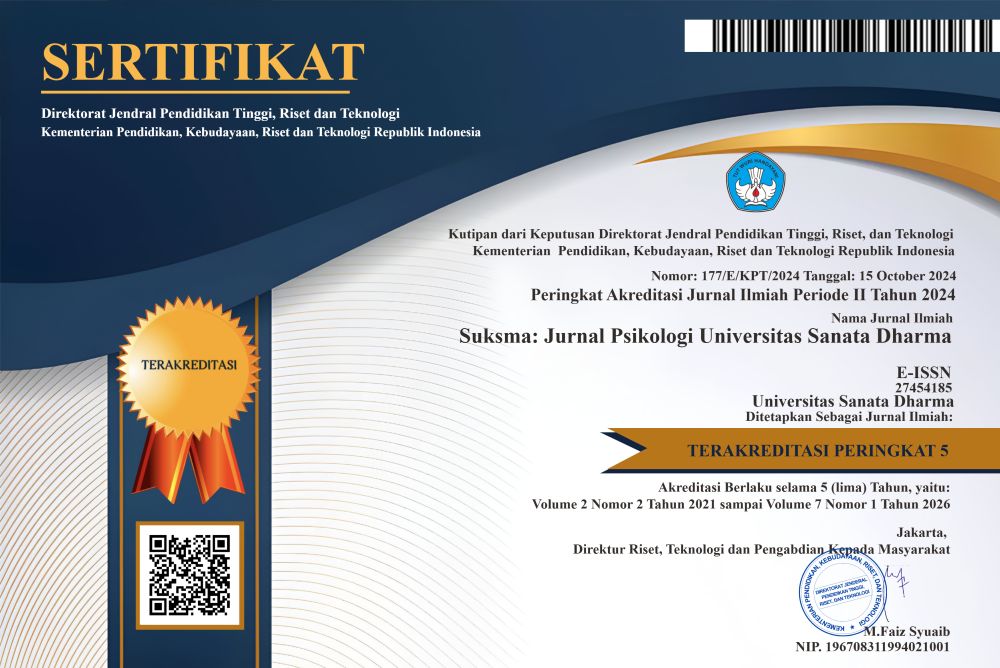Risiko Penurunan Kondisi Kesehatan Mental pada Remaja Pengguna Media Sosial yang Melakukan Self-diagnose
(1) Diponegoro University
(*) Corresponding Author
Abstract
The existence of information technology, especially internet bring increase awareness about mental health. On the other hand, the abundance of this information on internet and lack of understanding from adolescence about dynamics of mental health disorders bring negative impact of self diagnose. This research purposes to reveal the picture of self diagnose with adolescence mental health which social media user, the psychological impact, also what role social media do for the phenomenon. Methods of this research are qualitative methods with phenomenology design. Data collected with semi- structured interview with 4 participants (16-17 years old, 50% women) that already did a self diagnose and active on social media. Analysis technique use in this research is thematic research. The results are that all participants are curious about their mental health condition and sense of their mental illness symptoms, so that they search for information about their mental health from social media on the internet. This self-diagnosed behavior appears when they believe what happened to themselves are the same with mental health disorders. This what bring impact on their psychological such as worried, fear, even wakeful. Self diagnose without validation from professional mental health worker could trigger cognitive process to misunderstanding and false belief about the condition of their mental health and bring up a negative psychological impact.
Keywords
Full Text:
PDFReferences
Ahmed, A., Stephen, S., (2017). Self diagnosis in psychology students. The International Journal of Indian Psychology, 4(2), 120 - 139.
Annury, U., A., Yuliana, F., Dkk. (2022). Dampak self diagnose pada kondisi mental health mahasiswa universitas negeri surabaya. Prosiding Semnas Ilmu Sosial, (1). 481 - 486.
Chenghao, A. (2022). Stigmatization of depression caused by the spread of misinformation in social media-taking china’s douyin (tiktok) as an example. ISEMSS 2022. 3475 - 3481. https://doi.org/10.2991/978-2-494069-31-2_408
Creswell, J. W., & Poth, C. N. (2017). Qualitative inquiry and research design: choosing among five approaches (5th ed.). Sage Publication inc.
Dewak, H. (2023). Scrolling for a diagnosis: The effects of self-diagnosing content on social media on young adults’ mental health. Bachelor’s Thesis. Department of Psychology, University of Twente.
Dewi. E., M., Sari., R., Dkk. (2022). Psikoedukasi self diagnose: kenali gangguan anda sebelum menjudge diri sendiri. PENGABDI , 3(1).
Fadli, M., R. (2021). Memahami desain metode penelitian kualitatif. Humanika, 21(1). 33 - 54. 10.21831/hum.v21i1. 38075. 33-54
Gilmore, R., Beezhold, J., Selwyn, V., Howard, R., Bartolome, I., & Henderson, N., (2022). Is tiktok increasing the number of self-diagnoses of ADHD in young people? European Psychiatry, 65(S1), S571-S571. doi: 10.1192/j.eurpsy.2022.1463.
Kelly, Y., Zilanawala, A., Booker, C., Sacker, A. (2018). Social media use and adolescent mental health : findings from the uk millennium cohort study. E Clinical Medicine 6: 59 - 68. https://doi.org/10.1016/j.eclinm.2018.12.005.
Majumdar, A. (2019). Thematic analysis in qualitative research. In Qualitative techniques for workplace data analysis (hal. 197–220). https://doi.org/10.4018/978-1-5225-5366-3.ch009
Maskanah, I. (2022). Fenomena Self-Diagnosis di Era Pandemi COVID-19 dan Dampaknya terhadap Kesehatan Mental The Phenomenon of Self-Diagnosis in the Era of the COVID-19 Pandemic and Its Impact on Mental Health. JoPS: Journal of Psychological Students, 1(1), 1–10. https://doi.org/10.15575/jops.v1i1.17467
Molineux, A. (2022, n.d.). The health risks of self-diagnosing mental disorders. Medical News Life Science. Retrieved from: https://www.news-medical.net/health/The-Health-Risks-of-Self-Diagnosing-Mental-Disorders.aspx
Pahlevi, R. (2022, n.d). Penetrasi internet di kalangan remaja tertinggi di Indonesia. Kata Data Indonesia. Retrieved from: https://databoks.katadata.co.id/datapublish/2022/06/10/penetrasi-internet-di-kalangan-remaja-tertinggi-di-indonesia
Riehm, K.E., Feder, K.A., Tormohlen, K.N., Crum, R.M, Young, A.S., Green, K.M., Pacek, L.R., La Flair, L.N., & Mojtabai, R. (2019). Associations between time spent using social media and internalizing and externalizing problems among us youth. JAMA Psychiatry, 76(12):1266-1273. doi:10.1001/jamapsychiatry.2019.2325
Sadida, S (2021). Perancangan informasi fenomena self-diagnosis kesehatan mental remaja generasi z di media sosial Melalui Media Buku Ilustrasi (Doctoral Dissertation, Universitas Komputer Indonesia).
Santrock, J., W. (2012). Life Span Development: Perkembangan Masa Hidup. Erlangga.
Septiana, N., Z. (2021). Dampak Penggunaan Media Sosial Terhadap Kesehatan Mental dan Kesejahteraan Sosial Remaja di Masa Pandemi Covid-19. Jurnal Nusantara Of Research, 8(1). E-ISSN: 2355 - 7249.
Wellman, H. M., & Liu, D. (2004). Scaling of theory of mind tasks. Child Development, 75(2), 523-541.
Yuhana, E., S., Mariyati, & Sugiyanto, E., P. (2023). Pengguna Media Sosial dengan Kesehatan Mental Remaja. Jurnal Keperawatan Jiwa, 11(2). E-ISSN: 2655 - 8106
DOI: https://doi.org/10.24071/suksma.v5i1.7687
Refbacks
- There are currently no refbacks.


